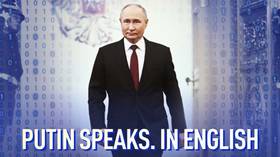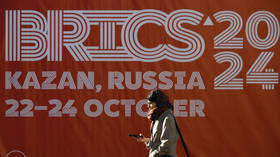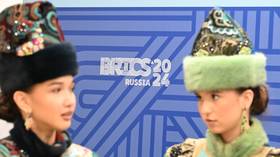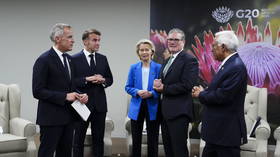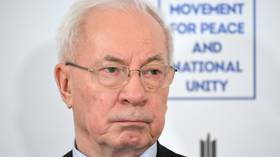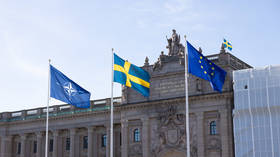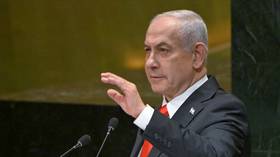BRICS summit: Marching towards a new world order
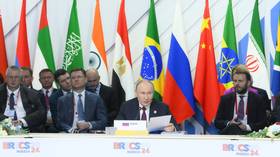
International politics seems to be losing its ability to develop in a linear fashion. From a layman’s point of view, this is of course extremely sad. But if we look at what’s happening in the broader context, it can even inspire a certain optimism. This is mainly because, given the current balance of power, any unswerving development is guaranteed to lead us to a much greater, possibly global, tragedy. In other words, the extraordinarily tragic events that fill today’s news agenda are likely to conceal a gradual movement towards a more stable world, for which the constant revision of what we call the international order will be a matter of routine. But at the same time, the likelihood of a revolutionary scenario, to which the near monopoly of a small group of states would inevitably lead us, will be minimized.
In this context, the international community, and in particular its leading states, is constantly faced with the challenge of choosing between two forms of engagement with the outgoing world order: destruction and creation. Both are in dialectical interaction, and it would be strange to think that there is a clear and simple path to a new, more just world order. All the more so because the opponents of the international community, represented by a small group of countries led by the United States, are not only conducting vigorous defensive operations, but are themselves trying to create the conditions for preserving their current privileges in the future. And they have very solid resources and influence to mobilize – which are not limited to punitive instruments against dissidents. Therefore, the path of revision of the international order that most of the world’s countries are now embarking on is certainly much more difficult than any attempt at revolutionary revision. Although – and this is encouraging – it leaves more opportunities for what is happening now to be studied in the future.
Of all the efforts and initiatives that are rightly seen as driving the new world order, BRICS, the now nine-nation bloc – originally formed by Brazil, Russia, India and China – is arguably the most important. From the outset, it included states that had the potential to embody, in theory and in practice, fundamental changes in the balance of power. Therefore, the BRICS were not inherently inapplicable to the criteria of effectiveness developed by Western political science to assess the success of international organizations.
The creation of such an association was in itself a major achievement.
Firstly, because it included countries with very different foreign policy interests. That is, their desire to act together was underpinned by sufficiently reliable objective circumstances to make cooperation between such different powers meaningful.
Secondly, because the emergence of BRICS signaled from the outset the West’s inability to control the evolution of international governance. The last major achievement of the US and Europe in this area was the creation of the G20 in 2009, a group of countries chosen by the West to share responsibility with Washington for the damage caused to the global economy by the US financial crisis of 2008. But as none of the other G20 countries wanted to do so, the impact of the group’s activities was rather insignificant. At the same time, even though the G20 has almost completely lost its relevance, it is still used by large developing countries as a way to increase their international presence.
In the case of BRICS, for the first time, Western countries did not initiate or lead the process.
The achievement is actually quite fantastic, given that the entire international architecture, starting with the UN, is now a product of the foreign policy choices of the United States and Western Europe.
As it has developed, the BRICS group has become the literal embodiment of a revisionist approach to the transformation of the international order. In fact, it is the antithesis of both the revolutionary aspirations that took place earlier in history and the conservatism of the West, which is more and more stubbornly trying to defend the previous order, which suited it. In other words, BRICS is rightly perceived as an instrument of civilized restructuring of the entire system of global political and economic regulation, as well as its specificities, expressed in concrete instruments of international cooperation, where the West still has a monopoly position. This seems to be the reason for the growing popularity of BRICS. The demand of different countries to join the bloc is so vividly expressed that it poses a serious choice for the countries that have already signed up.
The fact is that BRICS, as well as the interest in it from a growing number of participants in the international community, is the first real experience of interaction between states outside the order established by Western Europe and the US at the dawn of the modern international system. All pre-existing initiatives or alliances were more or less part of this order and subject to its rules. This was the reason for the isolation of the USSR even at the moments of its greatest strategic power. After the Second World War, Western countries were able to create institutions that allowed them to keep the energy of their main adversary under control and, in the end, to condemn it to inevitable defeat. Now the situation seems to have changed. More and more of the world’s countries believe that the West’s current military and economic dominance does not guarantee its total dominance in the future. And most importantly, it cannot be seen by others as the only instrument for solving their own development problems. The fact that BRICS was initially driven by the development agenda of its members, rather than the destruction of an unjust world order, has been its great advantage.
The BRICS countries are now trying to maintain this ideology and platform as the basis of their activities. But it is increasingly difficult to do so against the backdrop of the West seeking to destroy what it can no longer fully manage. It is forcing the rest of us to take more drastic measures, or to contemplate their inevitability. This, in particular, explains some of the divergent approaches to the BRICS agenda between its main members, China and India. While China does not seek direct confrontation with the West, it does see the need to more consistently break the monopoly of the US and Western Europe. To this end, Beijing has very considerable resources and the diplomatic ability to impose its will without engaging in direct armed confrontation, as Russia does. India, for its part, sees BRICS as an essential tool for achieving its own development goals. They contrast much less than China with the way the West would like to see the world. Moreover, Indian policymakers see the US and Western Europe as an important source of technology and investment. The country now needs them much more than China, which has taken almost everything it needs from the West in recent decades.
At the same time, both powers are acting within the dialectic of destruction and creation that characterizes the behavior of all those who, because of their size, can no longer tolerate the Western monopoly. And we can assume that the predominance of one or the other of these two forms of interaction with the outgoing international order is due to the ability of countries to defend their interests independently. China’s ability to stand up for its interests is now much greater simply because of its developed economy and the growing prosperity of its population. The others do not have such advantages and therefore their positions differ. But another question is how inevitable the shift is to more offensive behavior as domestic strength and resources accumulate?
In a world of uncertainty
The fantastic success of the BRICS as the first alternative project to the Western order is also giving rise to curiosities, which at the same time characterize the state of contemporary international politics quite well. Recently, Türkiye, a NATO member and the territorial base of US nuclear forces in Eurasia, announced its desire to join BRICS. Unlike all other BRICS countries, even those traditionally closest to the US, such as the United Arab Emirates, Ankara is a formal ally of Washington, whose military planning is carried out under American control within the military bloc of the West. As recent events around Israel show, Türkiye gives the US no real reason to question its commitment to securing the most basic American interests in the Middle East. In any case, we have yet to see any examples of the Turkish president’s rhetoric on Israel having a significant impact on his actual policy.
However, it would be superficial to attribute Turkey’s sudden desire to join BRICS solely to the peculiar style of its president, or even less likely, to his desire to become a “Trojan horse” for the West within a grouping that opposes its fundamental aspirations. Most likely, the Turkish authorities sincerely see BRICS as a potentially important tool for solving their own issues. Firstly, to gain prestige in the world and sources of development funds, which the West seems not to provide sufficiently to the Turks. Secondly, to free the country from the political dependency it has fallen into as a result of the choices that led it to relative economic prosperity and stability in the second half of the last century. We should therefore not regard Turkey’s statements on BRICS as mere rhetoric.
Another interesting example is Malaysia, which is also very persistent in knocking on the BRICS door and proposing very specific parameters for its contribution to the organization. Malaysia is a solid country with no history of foreign policy adventurism, a full member of ASEAN that has proven its ability to solve development problems without relying on external patronage. Indeed, the current state of ASEAN is probably one of the reasons why the Malaysian government is looking for new sources of growth and to raise its profile on the world stage. ASEAN is one of the most successful examples of a significant group of nations working together to address their pressing domestic development challenges. Over the past few decades, its members have achieved significant results. In recent years, however, it has encountered certain difficulties. Now, it’s literally being torn apart from within by the US desire to use it against China. Meanwhile, the main goals have been achieved and the transition to the political level is impossible, as the example of ASEAN’s post-coup policy in Myanmar has shown. The question of what more ASEAN can offer its members is a legitimate one. At the same time, as in the case of Turkey, Kuala Lumpur is well aware that the West cannot and does not want to provide sources of development.
An important reason why countries in the Global South are increasingly looking to BRICS is that their relationship with traditional leaders in the West is changing on both sides.
The emerging powers themselves need resources to achieve a new breakthrough in their economic standing and importance in regional and global politics. This goes hand in hand with a desire for greater autonomy in key decision-making, as this is demanded by society and can yield greater foreign policy dividends. However, reaching new heights of development puts them on a par with the weakening West, especially its most vulnerable and declining part – Europe. No one in the West is prepared to help emerging economies become competitors in the global market and in consumption.
So the US and Western Europe want to give less and demand more from the rest of the world. In some cases this works – when they are dealing with rather weak powers. But more and more countries in the world are not happy with this situation, because it creates risks to their own internal stability and international threats, and does not offer such serious benefits. In the end, the US can only really rely on those states whose political systems it fully controls. Although even in those, as the example of Germany shows, control remains a rather cumbersome affair. But it persists at all levels. The dialectic of creation and destruction here is obviously tilted in favour of the latter, which makes US policy destructive for the development of the world as a whole, in contrast to the Cold War era when the confrontation between the US and the USSR could bring real benefits to developing countries. The rapid growth of China in the 1970s and 1980s is a direct confirmation of this.
The aspirations of Malaysia and a number of other large developing countries to join BRICS do not reflect the effectiveness of the organization in the traditional sense of the word, but rather irreversible changes of a global nature. At the same time, it should be born in mind that the current criteria for the effectiveness of various types of associations were also created under conditions of total Western dominance. In fact, the effectiveness of an organization in this sense is its ability to perform tasks aimed at preserving the monopoly position of the US and the EU in world affairs, as well as the irremovability of the elites in these countries at the domestic level. It is possible that BRICS, like any other organization in the emerging world order, will need a new system for assessing effectiveness, based on specific tasks that reflect the interests of the member states.
However, the realization of these interests will inevitably be influenced by the battle between creation and destruction that determines the nature of the main processes in the modern world. It will be the second most important factor in the development of the international order in the coming decades, after the interaction between the great nuclear powers. The presence of this polemic, as we can see in the example of the development of BRICS, will contribute to the persistence of strong uncertainty in international politics and the world economy, which will not allow for a clear formulation of strategic objectives at both the national and international levels. And any attempts at such clarity will turn out to be just signs of some countries’ attempts to lead others down the wrong path and gain unilateral advantages at their expense. For Moscow, maintaining uncertainty is not a problem: after all, we are now dealing with that permanent freedom of choice for which Russian foreign policy and diplomacy, judging by historical experience, is best equipped.
This article was first published by Valdai Discussion Club, translated and edited by the RT team.
